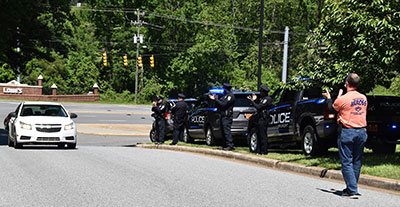Mercy in a pandemic
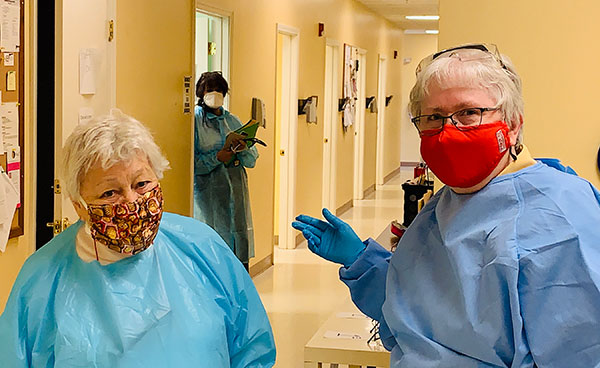 MOCKSVILLE — Sisters of Mercy aren’t ones to shy away from an epidemic. Ever since the Civil War, members of the order have cared for North Carolinians suffering from serious widespread diseases – yellow fever in the 1860s, AIDS in the 1990s, and now COVID-19. The sisters’ ministry of caring is a marvel to many, especially their patients.
MOCKSVILLE — Sisters of Mercy aren’t ones to shy away from an epidemic. Ever since the Civil War, members of the order have cared for North Carolinians suffering from serious widespread diseases – yellow fever in the 1860s, AIDS in the 1990s, and now COVID-19. The sisters’ ministry of caring is a marvel to many, especially their patients.
And it’s been that way from the beginning. Caring for the sick has been an integral part of the order since its founding in Ireland by Catherine McAuley in 1831 and its arrival stateside in 1843.
Therefore, when Mercy Sister Martha Hoyle heard that her Mocksville health clinic was likely closing during the COVID-19 pandemic, the thought of leaving her patients went against every fiber of her being.
“As Sisters of Mercy, we’re the first ones in. We couldn’t just drop them. That’s not right,” she says.
Pictured are Mercy Sister Susie Dandison and Mercy Sister Martha Hoyle at the health clinic in Mocksville., and a pharmacist and tech working on medicine in the clinic’s pharmacy. (Photos provided)
The health clinic operates within the Storehouse for Jesus, an entirely volunteer-run resource center that also includes a pharmacy and other services. It’s designed to serve those most in need in Davie County, especially the uninsured. Sister Martha uses her nursing and advocacy skills in her ministry at the center. Mercy Sister Susie Dandison is a Spanish-English translator there and is loved by the Hispanic population as well as the parishioners of St. Francis of Assisi Church as a true ‘madre.’
A native of Argentina, Sister Susie began teaching Spanish to Davie County children in 1999. Two of her former pupils now help with translating at the storehouse. “We could use more!” she says as she takes stock of how much the Storehouse for Jesus does for the community. “The organization, the coordination and willingness to work is amazing. The food. The clothing. It’s an incredible place. For this little town to have that offering, it’s a credit to the community here.”
They considered temporarily closing the Storehouse for Jesus because its volunteers are older and among those most vulnerable to the novel coronavirus. Many of them are seniors, including both Mercy sisters.
Sister Martha jokes, “Hey, what are you talking about? Who’s old?” She had her concerns, too, but knew they had to do something. So she called the director emeritus, Dr. George Kimberly, and worked out a compromise to keep the clinic open during the pandemic.
The pharmacy would remain open on Mondays and Wednesdays. Only patients who needed to see a doctor would go inside, and then they’d enter only from the side door and use as many precautions as possible, including personal protective equipment and other distancing and safety measures.
“People are so grateful that we’re there. It’s some kind of connection. We’re there because we want to be there and get blessed by doing it,” Sister Martha says. “The hardest part is not being on the regular schedule. The patients don’t have somewhere to go as often as they’re used to.”
She also notes that it’s difficult not being able to keep up with their patients who have been admitted to a hospital, due to restrictions on visitors. The sisters have been particularly concerned for a blind man who had been sick and has no family. They suspected he had COVID-19 and were later relieved to learn that he tested negative. “We try to keep up with them. It’s difficult not being able to be totally present to them,” Sister Martha says.
The health clinic isn’t taking new patients right now, but when someone comes with a serious health issue, the doctor and Sister Martha will see them. Many of their patients have chronic illnesses such as high blood pressure and diabetes that need to be monitored.
“We’re a Band-Aid so they don’t have to go to the hospital,” Sister Martha explains.
The pharmacy uses a drive-up station to process prescription refills, and the storehouse’s food program uses a similar drive-through modification: one station for orders and another for pick-up.
At 87, Sister Susie is one of the most vulnerable – and valuable – of the volunteers. She has been calling patients from home to let them know there is food and the pharmacy is open. She translates via phone for Spanish-speaking patients being seen at the clinic. “I’m taking as good care of myself as I can while doing as much as possible from here,” she says.
Inside the Storehouse for Jesus, the doctor on duty and Sister Martha dress in full PPE. “I look like someone’s mummy,” Sister Martha jokes. “I have a mask, face shield, gloves and fluid-resistant gown.”
All humor aside, the sisters know well the importance of caring for others during an epidemic.
Sisters of Mercy and the Yellow Fever Epidemic
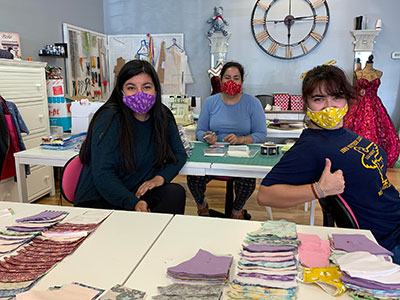 In the late summer of 1862, a ship from Nassau, Bahamas, docked in Wilmington, stocked with bacon and other food. Full of gratitude and eager to get the goods to their soldiers on the battlefield, the residents of the port city waived the yellow fever quarantine restrictions in place at the time.
In the late summer of 1862, a ship from Nassau, Bahamas, docked in Wilmington, stocked with bacon and other food. Full of gratitude and eager to get the goods to their soldiers on the battlefield, the residents of the port city waived the yellow fever quarantine restrictions in place at the time.
A few days later, physicians reported several cases of yellow fever. They had learned that several sailors aboard the Nassau vessel had been ill, and when the sailors came ashore to get water from local residents Mr. and Mrs. C.P. Bolles, the couple contracted the disease.
Years later Mrs. Bolles wrote about the epidemic and those who risked their lives to care for the sick – including the Sisters of Mercy who were sent by Charleston Bishop Patrick Neeson Lynch at the request of Father Thomas Murphy. Led by Mother Teresa Barry, three Sisters of Charity of Our Lady of Mercy left Charleston for Wilmington: Sister Mary Augustine Dunne, Sister Mary Patrick Collins and Sister Mary Peter Sullivan. There are accounts of additional religious sisters in the area, including the Sisters of Our Lady of Mercy, who ministered to soldiers during the war.
“The disease spread rapidly, after the first two weeks our physicians had more than they could contend with, and Charleston was quick in responding to the call for assistance, sending her physicians, and nurses, as many as were needed, a dozen or more Sisters of Mercy,” Mrs. Bolles recounted.
“As I made my way over to the window one day about the middle of October to see if the weather cock across the street on the pinnacle of the Cape Fear Bank Building, indicated any change in weather, feeling so desperately hopeless, with no one near me but my husband who was too ill to realize the situation. As I looked out I saw all windows closed with no sign of life save the Little Sisters of Mercy darting across the streets – flitting from door to door, entering to administer to the sick and dying.”
Divine Providence in the Lives of the Sisters
More than 1,000 people died in Wilmington’s yellow fever epidemic, which lasted from the first week of September until Nov. 6, 1862. That day, a heavy snowstorm quelled the raging outbreak, and no new cases were reported. The three Mercy sisters ministering in Wilmington returned to Charleston.
Although North Carolina weather is famously unpredictable, a snowstorm on the coast in autumn must have been considered an act of God. The Sisters of Mercy have noted His hand in their ministry during this current pandemic, too.
Right before the COVID-19 epidemic hit the United States, a local plant in Mocksville that had just changed its PPE supplier gave the sisters’ clinic two boxes of N95 masks, gloves and fluid-barrier gowns.
“It seemed like it was way too much, and then it wasn’t,” Sister Martha says. “I’m amazed constantly at this place.”
When those supplies began to run out last month, a supporter approached the sisters asked them if they needed masks at the clinic. Soon, Sister Martha was connected with Kat Manzella of Jamestown who runs Kisses4Kate, a nonprofit that helps children with cancer and their families in a variety of ways, including sewing masks and gowns for Brenner Children’s Hospital.
Two days later, Manzella delivered 75 individually-packaged masks, made using her personal funds, to Sister Martha in Mocksville.
“Sister Martha was just so cute and grateful. She said she’s praying for us and that we were all miracle workers. She is actually the miracle. I can’t do what she does,” Manzella says. “It has given me great joy to have the opportunity to help Sister Martha and Sister Susie. God always watches out for His servants.”
The supply quickly ran out at the clinic and on April 23, the sisters received another 100 masks made by Catholic laywomen of the Triad, including Manzella of St. Pius X, Barbara Markun of Our Lady of Grace, January Mills of St. Paul the Apostle, Karen Black of Immaculate Heart of Mary, and Shannon Flaherty of Christ the King.
“Our patients can’t believe someone would do this for them. We can’t hug them now, but we’re a hugging
group,” Sister Martha says. “Being able to give them a mask is almost like giving them a hug from a distance.”
The sisters also note regular support and communication from the motherhouse in Belmont and help from community members as well as their local Knights of Columbus Council 12610 of St. Francis of Assisi Church in Mocksville.
“We struggle with getting medicines, and people are donating their stimulus checks without our asking,” Sister Martha marvels.
“There’s an old hymn I’d sing when caring for AIDS patients: ‘He’s An On Time God.’ When I get in a stress, I start humming that. God’s going to come when He’s ready, and it’s always the right time.”
— Annie Ferguson, correspondent
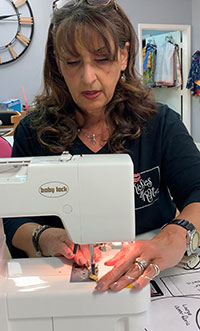 Kat Manzella and others sew masks at Kisses4Kate that they are donating to local community groups and ministries in need.
Kat Manzella and others sew masks at Kisses4Kate that they are donating to local community groups and ministries in need. 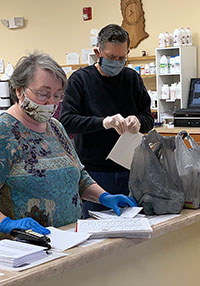
‘Faith over fear’
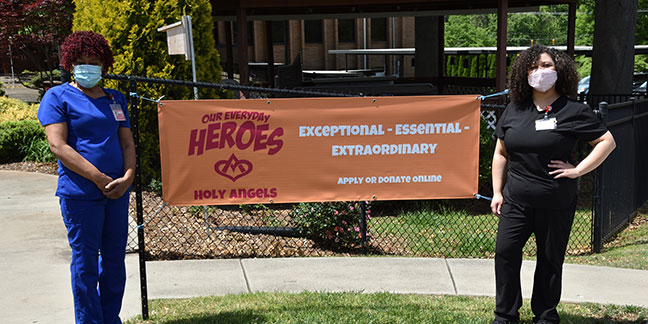 Health care heroes at Holy Angels were honored the week of April 27. (Photos provided by Holy Angels) BELMONT — Protecting the most vulnerable people among us is at the core of Holy Angels’ mission. Day in, day out, the staff gives tirelessly of themselves in this long-term residential program to care for children and adults who have delicate medical conditions.
Health care heroes at Holy Angels were honored the week of April 27. (Photos provided by Holy Angels) BELMONT — Protecting the most vulnerable people among us is at the core of Holy Angels’ mission. Day in, day out, the staff gives tirelessly of themselves in this long-term residential program to care for children and adults who have delicate medical conditions.
Contracting COVID-19 could prove fatal for any one of Holy Angels’ residents.
“So far, Holy Angels has not had any cases of COVID-19, with residents and staff,” says Regina Moody, Holy Angels’ president and CEO. “We live each day in ‘faith over fear.’ We follow the CDC guidelines as well as the North Carolina mandates. This has been difficult, especially for our families who are unable to visit,” she adds.
Holy Angels’ staff have kept up residents’ daily routines and helped comfort them since the pandemic began and visitors were barred from health care facilities in North Carolina. Staff are using Facetime and other video conferencing tools to help residents communicate with their loved ones during pandemic.
Charli Somers, SCR program director, says, “It is important for me to continue coming to work for our residents. They are not able to go elsewhere, so I feel it is important for us to show up for them, to ensure they aren’t feeling uneasy or scared but instead feel nothing but love during these strange times.”
Somers knows it is difficult for residents not to see their families, “and while we cannot replace their family, we sure are trying to keep them engaged and happy! It is so important that during these times we maintain the highest level of normalcy that we can, even if only between the walls of Holy Angels.”
Care providers at Holy Angels, these everyday heroes, have increased the protective measures and equipment they are using to keep residents healthy while the novel coronavirus remains a health threat.
Staff are using personal protective equipment while caring for residents and they are taking precautions in their off hours, staying away from their own loved ones in some instances so they don’t accidentally bring COVID-19 in to Holy Angels.
Fannie Rendlemen, a clinical secretary and health care technician who has served at Holy Angels for the past 36 years, is doing her part to keep residents safe.
“I have taken precautions such as wearing my mask outside Holy Angels,” she says. “I limit where I go. I haven’t seen my granddaughter in person since the Angel Bowl (March 7). I’m just trying to be very cautious. I don’t want to bring anything back to the residents.”
April 27 marked 50 days since the quarantine began at Holy Angels, so to acknowledge the heroic efforts of the staff, management and local authorities honored the health care heroes.
“We felt this was a time to celebrate all of our staff who work tirelessly to support our residents,” Moody says. “Our local police and fire department came and welcomed the staff early that morning and again in afternoon for the second shift. It was very nice and moving.”
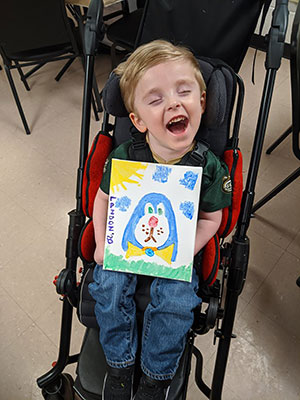 “We are grateful to the City of Belmont and the first responders (who came out). They are really supportive of Holy Angels and we are grateful they came here. It was a beautiful day,” she says.
“We are grateful to the City of Belmont and the first responders (who came out). They are really supportive of Holy Angels and we are grateful they came here. It was a beautiful day,” she says.
During that week, Holy Angels gave their staff “Everyday Heroes” T-shirts, heroes Hershey bars and personalized face masks to say thank you.
The increased need for protective measures and equipment at Holy Angels means that costs associated with residents’ care have mounted during a time when donations have dwindled and fundraising events have had to be canceled.
Holy Angels has also had to temporarily close the businesses and programs that fund its mission, including The Cherub Café, Cotton Candy Factory, Bliss Gallery, Spruced Goose Station and more.
“Our loss of revenue from programs, businesses and reduction/cancellation of fundraisers has resulted in a $1.2 million shortfall,” Moody says.
Moody expects increased costs for personal protective equipment and cleaning services going forward, which will add to Holy Angels’ financial needs.
“We are using much more PPE than we ever have,” she explains. “That need is going to be a constant for us. Additional precautions have ramped up our cleaning costs considerably.”
Holy Angels has also redeployed people in some of its businesses to environmental services to assist in critical care services for residents.
“Our goal is to keep people working,” Moody says.
“During the COVID-19 pandemic, it is extremely important to ensure we are taking all of the appropriate precautions to prevent residents from getting sick,” says Ashley Brown, special education teacher.
Brown emphasizes, “Their lives depend entirely on the staff caring for them and protecting them from harm. Unlike other jobs, Holy Angels does not close down. The kids’ lives continue, so it’s not a profession that can stop during a crisis. The job still needs to be done every hour of the day.”
— SueAnn Howell, senior reporter
Help Holy Angels

Holy Angels depends partly on donations to provide the highest quality care for children and adults with delicate medical conditions.
The Holy Angels Foundation is a private, nonprofit corporation and sponsored ministry of the Sisters of Mercy of the Americas, South Central Community.
To donate to Holy Angels, visit the website at www.HolyAngelsNC.org. Donations can also be mailed to: Holy Angels, P.O. Box 710, 6600 Wilkinson Blvd., Belmont, N.C. 28012. Questions? Call 704-825-4161.


